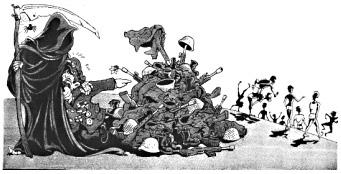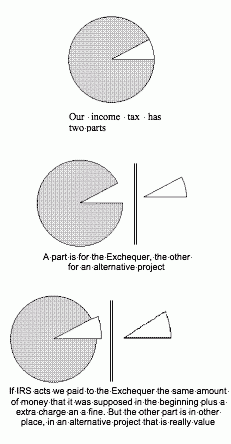The idea

The first campaign on War Tax Resistance in Spain was held in 1983. A group from Andalusia (the Non-violence Assembly) brought the idea from Italian campaign. Next year Justicia i Pau (Pax Christi) from Barcelona, the Non-violence Assembly from Cantabria and the Movement on Conscientious Objection, with groups all over Spain, spread the idea and we can say that it was in 1984 when our campaign was really born.
Since this moment we have prepared for 21 years a campaign on war tax resistance that has maintained its principal lines along the time. The idea is simple: We have the right to refuse to kill and, in consequence, we have the right to refuse to pay for killing. And that is what military expenditure supposes: the preparation for killing.
How can we put in practice this right? If we stay waiting for the permission of the government we know that we will never reach it, so we put it in practice form the first moment. We diverted a part of our income tax from the Exchequer and we gave this amount of money to an alternative project that defends what we should defend
(that is what we use to say).
At the same time, we send a letter to the Exchequer telling them what have we done, which has been the alternative project that we have chosen and, that is important, we asked to insert next year, in the forms of income tax, an option in order to be able to put in practice our tax resistance. We are not making a question about our taxes. They exist and we pay them. But we don't want pay for armies, so we propose to have an option about this. It could be something like which kind of defence do you want, military or civilian?
Income Tax in Spain
I think that it's interesting to explain something about income tax in Spain. During Franco's dictatorship (1936-1939 Spanish (un)civil war, 1939-1975 Franco's regime) there was something like income tax but very few people had the duty of paying it. In 1978 (more or less, I'm not an expert) the system for paying taxes, specially income tax, was changed and it was universalised: since this moment most people have to do it.
When we went to the 4th International Conference in Brussels, 1992, one of the participants told to us that he would be very happy if he could fill the income tax as twenty years ago
. And how did you did your income tax twenty years ago, we asked.
We filled the income tax form by ourselves, he said.
We rested surprised hearing this: this was the way we did our income tax process. We filled by ourselves the form.
And we still have this possibility. Anyway, six years ago we started having another one: we could go to a public office or to a bank office bringing all our documents, and there put on the form all the numbers we brought, with the help of a computer program. The program does mathematical operations, nothing else.
Now, since two years, we have another possibility: now the Exchequer has all the documents (our employer, our bank,... send them to it) and it sends to us a filled form. If we agree, we accept it and it will be very fast (usually, we have to receive a small amount of money). If we don't agree, we can refuse it, buy the forms, fill them by ourselves and present them. In this case we still having the opportunity of crossing out some item that we don't use and write there because I am tax resister against military expenditures…
and the amount of money that we divert.
That's about the rules. But we have to say something else about income tax in Spain: Since 1978 most people have to do it, but there was not the custom. Now it's different, it's really usual, but there is another singularity: in Spanish society it's not very bad thought to evade one's taxes (including from a penal point of view: at this moment I can't remember even one person that has been in prison for fiscal evasion).
Our concrete proposal
The way in which we realise our tax resistance is to put in a place of our income tax form that we don't have to use a single sentence: for Tax Resistance to military expenditures, and then, in the respective box, the amount we divert. For example, we propose to do this in a box called for international double taxation
. It's supposed for people that have already paid some taxes abroad, but I don't know anyone in this case, so it uses to rest on white.
But it's easier to realise income tax declaration at the bank office or to accept the proposal sent by the Exchequer, so we have a second proposal for the people who do their declaration by one of these automatic systems. In this case, the tax resister must sent an official application to the governmental office explaining that he or she is a tax resister, that he/she has paid a part of his/her income tax to an alternative project and that the presented declaration must be modified in order to adjust this change.
At the beginning we proposed an amount calculated by a percentage. If we had to pay 1.000 peseta (that is very few, it's an example) and military budget was, this year, the 10% of total public budget, we diverted 100 peseta. It was a very pure proposal. But it was a real muddle. Some times, our meetings seemed more a math class (some of us were really happy having such interested pupils) than a political discussion.
Another problem: the military budget has never been clear in Spain. Even NATO has scolded Spanish Government because is not possible to know which is the real military Spanish budget (NATO's cost appears in Foreign Affairs, military industry development in Science and Technology, military aid for countries of the third world in Developing Help,…) and some times to decide the real percentage to be applied was a too deep discussion. We were tax resisters, antimilitarist, conscientious objectors but not experts in military spending.
And we found a third problem in our developing: when the Inland Revenue examines your income tax forms, it has the possibility of examining the declarations of the last five years. And if military budget is big, the amount of money diverted by tax resistance was big too. And if you join five years objection then that is too big. We discussed a lot about this. It seemed to us a sign of weakness. But one of us said in an assembly: We are doing a race against the Government. It's not a short distance race but a long distance one. And long distance races are not steeplechases, so we have to avoid to put obstacles in our way.
To recognise these problems took to us several years but in 1991 we started proposing a fixed quota
. This year was the first Gulf War and Spanish Government sent three ships there so we said Three ships for war? Three thousand peseta for peace
And most tax resisters diverted 3.000 pesetas (nowadays, they would be 18€). Next year, 1992, was the fifth centenary of the discovery of America, so we proposed 5.000 pesetas (30€). Some years after we proposed 7.000 pesetas (42 €), making a link with the demand of the 0,7% of the budget for developing aid and, finally, we passed to propose 8.400 pesetas (50,40€) because in the UN's ranking of countries there were 84 countries under the line of minimum development. When the euro arrived, we started proposing 84€ and there we are. Well, we propose (I translate from our leaflet) We suggest 84€. Or 84 cent! You have to decide by your own. But it would be nice if it finished in 84
.
What do we do with the diverted money?

Every tax resister has to decide where he/she wants to send the diverted money. This is his/her responsibility.
First year we didn't gave any idea, later we included in our leaflets some groups and their bank accounts that could be receptors of this money. We didn't like it too much but peopled asked for it. During three years we maintained it, but it was a matter of a big discussion: why this group yes and why this group no? This group has other ways of finding financial resources. This group is promoting a civilian service and the movement on conscientious objection is working against this, promoting total resistance. This group is very nice in Malaga but the same group is not at all nice in Santiago,… Believe me: a very hard matter of discussion.
In 1987 (I think) we started proposing a collective project. Not as an imperative, only as an idea. We started proposing an internal project (inside Spain) and an international one. It was a good idea (it was not ours, we learned it from abroad) and the results have been fine. Many projects have been supported.
In Spain, among them, we find the fight against shooting ranges (two of them were never built), groups helping minors, antimilitarist magazines, promotional groups of alternative bank system, teachers working against military presence in schools,… But in some years time we realised that internal needs where not so big, and last years we have proposed, some times, only international projects.
Some of them have been schools in Nicaragua, El Salvador, Sahara,... groups working for the development of women in Philippines, Women in Black in former Yugoslavia, Villages in Colombia, Indian groups in South America, water supply in Eritrea and Lesotho, groups for dialog in Palestine and Israel, the struggle of conscientious objectors in Turkey and Paraguay,…
This year, the project we have proposed has been the support of groups working for democracy in Zimbabwe.
Some results of our campaigning
It's really difficult to give a real photography of the results of our campaigns. We try to have a control, buy we have not had a big success at this point.
2000 --> 22.539,00€
2001 --> 36.092,00€
2002 --> 31.402,50€
2003 --> 41.638,74€
Any tax resister has to decide where does he/she want to put the diverted money. We propose a collective project and we have a bank account for it. In the adjacent table you can see how much money have we collected in this account last years. In 2003, the number of people that used this bank account was 458.
Does that mean that last year we were in Spain only 458 tax resisters and that we diverted only 41.639,74 €? Not at all. That is a minimum, perhaps an small minimum. I will give you another reference. This year's campaign finished at the end of June. We have not yet got the results of it. We are still receiving the letters of tax resisters giving us notice about their tax resistance. But I have processed the numbers we have received in Navarra, the region where I live.
Last Wednesday we were 53 people who have diverted 3.013,57€. From these 53 people 29 have sent their money to the proposed collective project, that is the 54%. And the amount of money put in the collective account is 1.607,68€, that is the 53%. In both cases, we can say that the number of tax resisters and the amount of money diverted that appears in our account is only half of the total figure.
Going back to the results of 2003, can we think that we were 864 tax resisters and that we diverted more than 78.500€? We can think it, but we can not assure it, so we have to keep this in our mind and to talk about what we really know.
We do really divert money from military budget
No, of course we don't. First of all, the amount of money we diverted all together, 41 thousand euro or 80 thousand, is really a small amount of money within the public budget. And the government has its priorities and military budget is among them, so the army has assured that it will receive all the money it wants. Probably even more than the amount recognised in the public budget.
And there is another problem. It's not usual, it happens only some times and to only some tax resisters, but it can happen: Inland Revenue sometimes realises about what have we done and it acts, first of all telling us that we did a mistake when filling our income tax forms, that the fiscal reduction
we applied does not appear in income tax regulations. We answer saying that it is not a mistake, but a very serious action and that the people working in this governmental office must realise that our conscience and rights are more important than any other regulation and that they must accept this.
So Inland Revenue, in this cases, acts and does a seizure against our bank accounts or against our salary. There is nothing to do in order to avoid this (except not have bank accounts and not have a salary but in this case, usually, people don't pay income tax).
That is the reason we have to say that our non-violent action is not civilian disobedience but non-cooperation. At the end (if Inland revenue Service takes notice and it decides to act) the will get the money.

But meanwhile we have organised a public campaign against the military budget, we have given a press conference at the beginning of the campaign (middle of April) giving notice about it, we have been for two months with a public office helping people to fill their income tax forms including tax resisters, we have collected the results of the campaign (as far as we can know), we have given another press conference presenting this local results (at the end of June), we give another press conference (or only a press release) presenting global results (autumn) and when the Parliament is discussing (accepting) military budget we try to have some public presence. The last press release we did started with the next sentence: War is a crime against humanity
. We think that this has a big value even if Inland Revenue takes us the money we diverted (with an extra charge by delay and a fine for non co-operation with them). We spread the idea that it's necessary to do something against military expenditures.

And we have supported some nice alternative projects,the one we have proposed as collective project and all the others that some tax resisters have selected.
So do we pay twice?
Not really. In our opinion, the money we have diverted to an alternative project has a value by itself and we don't consider it as money paid to the Exchequer. So we pay to the Exchequer the same amount that was supposed (plus the extra charge and the fine).
Discussing about military budget, we would like to be real disobedient people against the government, but we can not be. Or we have not found the way to be. We have found a way to make civil resistance by non co-operation. That's what we do. We must recognise it and we do it. Without any problem, because we are proud of it.
In short
We propose non-cooperation with the government on the military budget. We know that there is a long way in front of us until the moment the government will recognise our right to refuse to pay for killing. So we prefer a non-obstacle way that gives to us the possibility of doing tax resistance one year after the other.
By the way, we use our campaign to make criticisms against military expenditures and to spread our message of resistance, civilian resistance.
With our action, we made criticisms against militarism, but we make steps building a civilian defence that is outlined by the different projects we have supported.
Pamplona-Iruñea, 2004 June 5th
Pedro Otaduy

Tax Resistance Group
Bakearen Etxea
La Merced 18, 31001-Pamplona-Iruñea
